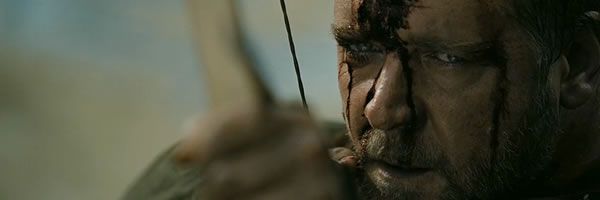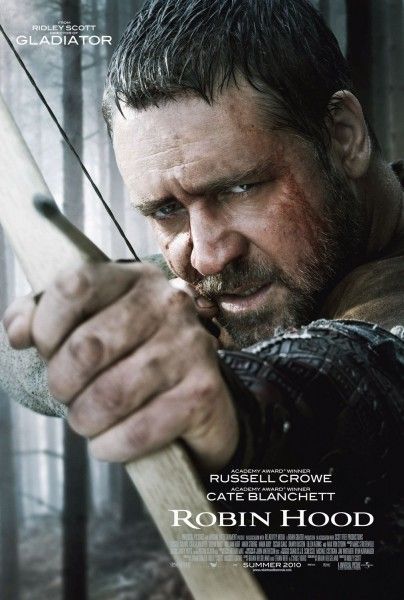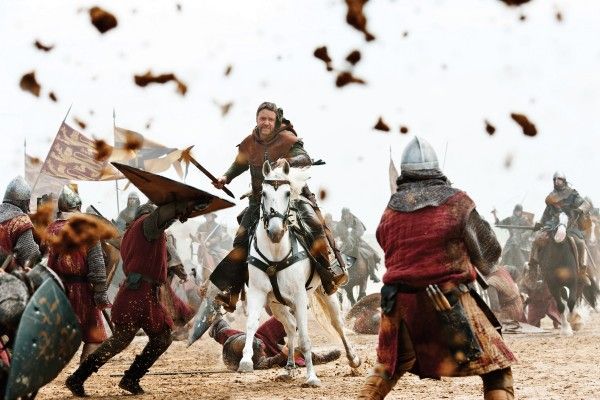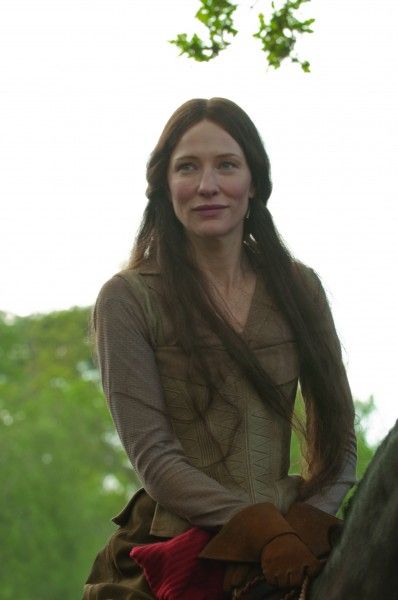When Ridley Scott made Kingdom of Heaven, he ended it with King Richard the Lionhearted asking directions to Jerusalem, and on the commentary track for the director’s cut Scott suggested he had an idea for the sequel. It would be a Robin Hood story, but with his main character from KoH. That film wasn’t a hit, so when Ridley did get to the legend of Robin of Locksley, he had Russell Crowe as his lead. Russell Crowe is no spring chicken, and the decision to cast the 40+ actor as the sprightly archer seems off, but if you’re going to make a $200 Million dollar movie, that’s the sort of compromise that going to happen. Scott and Crowe are basically cashing in their Gladiator chips, by – after having a huge success – making the expensive “sorta same, sorta sequel” film. My review of the Director’s Cut Blu-ray of Robin Hood follows after the jump.
Robin Hood here is not Robin of Locksley, Crowe’s character is just a simple (but talented) archer) in King Richard’s army. The film opens with a big battle in Gladiator mode, with Richard (Danny Huston) callously leading the charge and the film here is firing on all cylinders. Scott’s doing what he does well, the battle scene is well put together, and then there’s a twist: King Richard is killed. The real Robin of Locksley accompanies the body, but is ambushed by the evil Godfrey (Mark Strong), who is working for France and the new King of England John (Oscar Isaac). But Robin and his merry men stumble on Godfrey, and so they get the king’s crown back. Robin also gets to hear Locksley’s last words, and has a dying wish: that his sword is returned to his father. Thinking the juice is worth the squeeze, Robin goes to the king pretending to be Locksley, and then returns to Nottingham to deliver the sword.
Here is where the limitations of Scott are present. Scott is one of the greatest directors of all time, of that there is no question, and I would argue that The Duelists, Alien, Blade Runner, Thelma and Louise, the director’s cut of Kingdom of Heaven and Black Hawk Down all qualify as masterpieces. What he’s never handled well is the sort of Spielberg-esque light comedy thriller stuff, and that’s what this material requires. You can see the film starting to have trouble when the sequence where Robin is pretending to be Locksley in front of the King doesn’t snap to life. Then Robin does go to the Locksley household to return the sword and Sir Walter Locksley (Max Von Sydow) asks Robin to pretend to be his son, and pretend to be married to Maid Marion (Cate Blanchett). If this were a great movie, this would be a standout sequence, but no.
The film starts building up some goodwill, as the interplay between Blanchett and Crowe is nice and fun, and though clichéd the merry men (Kevin Durand, Scott Grimes, and Alan Doyle) and Friar Tuck (Mark Addy) are charming enough. But then in comes destiny. Robin is actually the son of a man who once suggested democracy and freedom for the land, but was killed for his radical views. And both Sir Walter and William Marshall (William Hurt) want him to reclaim his inheritance by leading the people of England to victory. And as Godfrey is fomenting a French takeover, and there’s also an attack being made on Nottingham, etc.
If the film was passable until the third act, it really gets terrible toward the end as it has two climaxes (the attack on Nottingham, and the French invasion), with neither that successful as set piece. The ending fight against the French pits the slightly bland villain Godfrey against Robin Hood, but since Robin Hood’s signature weapon is the long bow, he has to kill Godfrey at a distance. The film though doesn’t make great use of the bow as a weapon – partly because it isn’t that cinematic (the reload time and distance) – and so that ending is flat, while also Marion shows up at the end battle. This feels incredibly forced, and either as a target demo move, or in a callback to Elizabeth, it’s stupid, and Marion serves no point in being in the middle of it. Then comes the conclusion where it points out the whole is about getting Robin Hood in the position of being the Robin Hood of lore. So the whole movie functions as a prequel.
Unfortunately, we keep seeing more of this. Though the new Star Trek was entertaining enough, the whole movie functions as set-up, as does this. This seems like a trend that started with the latest superhero movies, where the origin tale has to be told, and I guess that makes sense for a rebooting of a franchise. It’s safe way to make a movie, whilst also setting up a franchise, but I’ve never cared how Robin Hood became Robin Hood, I just want to see Robin Hood be Robin Hood. And frankly, I don’t care how a superhero became one, etc. I just want a story to be told, and so much of the modern blockbuster seems afraid to even do that much. But what you’re left with is a sense that the movie you’re watching is an advertisement for the sequel. Fuck you, movie.
Universal presents the film on Blu-ray in a perfect widescreen (2.35:1) transfer in both the theatrical (140 min) and a director’s cut (156 min) which sets up somewhat better the lost boys who join Maid Marion in the climax. This does not fix anything. The soundtrack is an appropriate loud and powerful 5.1 DTS-HD track. The Blu-ray edition also comes with a copy of the DVD and a digital copy. There’s no commentary (surprising for a Ridley Scott film), but there is a “Director’s Notebook” function where there are comments from the makers and an option to go still galleries that offer photos and “Ridleygrams” (Scott’s storyboards). This is its own video track, and the PIP footage pops up about ten times throughout the film. There are also ten deleted scenes (13 min.) with optional commentary and intro by Pietro Scalia. Then comes the making of “Rise and Rise Again” (63 min.), the highlight of which is Russell Crowe, who is endearingly honest. They also talk about how Crowe made the casting decisions on who played the Merry Men, which gives the impression the film was more Crowe’s than Scott’s (which is somewhat reflected by Scott’s involvement with this Blu-ray). The Art of Nottingham has still gallery sections for Pre-vis/Storyboards, Production Design (with Arthur Max intro), Costumes (with Janty Yates intro), and Behind the scenes photos that can be viewed individually or in a slideshow. The disc is wrapped up with two trailers and six TV spots.




